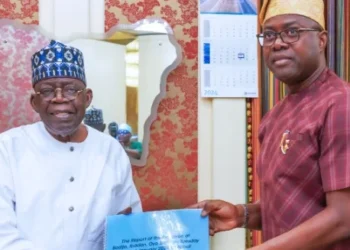

Oyo State governor, ‘Seyi Makinde, has advocated for the integration of the traditional institutions into the development systems of the country, as they remain important to nation-building and have continued to have the trust of the grassroots, which is central to development.
He called for the relevance of the institutions to be recalibrated, stating that it has become imperative to reform legal frameworks to provide clarity on the roles, rights, and recognition of traditional councils and strengthen the security architecture to formalise community policing strategies rooted in traditional structures.
Governor Makinde, who stated this in Akure, at a colloquium organised to mark the 10th anniversary of the Deji of Akure, Oba Aladetoyinbo Ogunlade, Odundun II, added that it had also become important to elevate cultural diplomacy and tourism, which would place the traditional institutions at the heart of heritage, arts, and youth engagement.

This was as the governor said that the goal of the Peoples Democratic Party (PDP) and the African Democratic Congress (ADC) in trying to unseat the All Progressives Congress (APC) is the same, adding that everyone is free to belong to whatever party they want but should put the country’s interest first.
Speaking in an interview with journalists, Makinde reiterated that the PDP could not be threatened by any political party, because it has become an enduring institution, charging anyone who wants to hold down the party to feel free to leave.
While congratulating the Deji of Akure on his 10th coronation anniversary, Makinde, who was the Keynote Speaker at the colloquium, said his reign has brought in unprecedented developments and progress to his domain, even as he prayed to God to grant Kabiyesi more impactful years on the throne of his forebears.
Stressing the strategic role traditional institutions play in governance, conflict resolution, and community development, Governor Makinde said the traditional rulers should no longer be seen as relics of the past but enduring pillars of identity, legitimacy, and communal cohesion.
He noted that his government in Oyo State has had an engaging relationship with the traditional institutions, which play active parts in the state’s security architecture, conflict resolution and tourism, stating that the engagement has produced positive results across many fronts.
The governor maintained that the push for a constitutional role for the traditional rulers is in order and would enable them to participate, contribute and also be held accountable.
He said: “Just last week, I had the honour of presenting a book that explores the complex story of OPL 245, a case that opens a window into governance, ownership, negotiation, and how institutions shape the destinies of nations.
“I reference that event because, in much the same way, our traditional institutions are also part of our national inheritance — older than oil, deeply cultural, and even more consequential to the future we seek to build.
“Yet, all too often, traditional institutions are misunderstood. Some imagine frail old men who have outlived their relevance. Others view them as mere instruments of political endorsement. That mindset must change.
“Traditional institutions are not relics of the past. They are enduring pillars of identity, legitimacy, and communal cohesion. Long before Nigeria’s formal administrative systems took root, traditional rulers dispensed justice, upheld values, coordinated local security, and kept communities united.

“Today, they remain custodians of grassroots trust. And nation-building that ignores them does so at its peril. No wonder politicians continue to seek their blessings and validation.
“In my own public service journey, I have come to see that strengthening traditional institutions is not simply about cultural preservation — it is strategic governance.
“In Oyo State, we have taken deliberate steps to integrate our traditional institution into the governance architecture. Permit me to highlight a few of these steps: We institutionalised their role in the State Security Council. Our royal fathers are not bystanders. They serve as first responders, sources of local intelligence, and advocates for peace. We passed laws to remove ambiguity around succession and throne ascension. The outcome? Fewer legal battles, reduced communal tension, and enhanced legitimacy for our royal fathers.
“Most critically, we do not interfere. We trust the custodians of tradition to manage their own succession processes. This principle of non-interference has fostered dignity, autonomy and internal cohesion.
“But of course, this journey has not been without its challenges. Some of the impediments we continue to face include: Jurisdictional conflicts between traditional institutions and local government councils. We even have an ongoing conflict because we are re-introducing the Traditional Council, but I know we will overcome them.
“Political capture, where titles are wielded as tools for political allegiance, thereby eroding neutrality; lack of constitutional clarity, which leaves traditional rulers vulnerable to political goodwill rather than protected by a legal structure.
“Still, these challenges do not diminish the value of our traditional institutions. They simply point to the need for thoughtful reform and a more coherent national policy.
“Indeed, when respected and empowered, our traditional institutions deliver measurable impact: They help resolve conflicts at the community level, often preventing escalation to violence. In Oyo State, we have institutionalised alternative dispute resolution mechanisms that work hand-in-hand with our traditional institutions.
“They are vital to community policing. The Amotekun Corps has seen significant success partly because our traditional rulers support and mobilise their communities around the initiative. “They encourage development ownership. Many of our tourism sites in Oyo State— such as Iyake Lake and Idere Hills — are community-run under the stewardship of traditional leaders. “Our efforts to attract investment to these areas are not aimed at taking them away from their custodians, but at unlocking even greater opportunities for local development.
“So, what does the future hold? The relevance of traditional institutions must be recalibrated, not politicised, but purposefully integrated into our broader development systems. That means as a nation: Reforming legal frameworks to provide clarity on the roles, rights, and recognition of traditional councils; strengthening our security architecture to formalise community policing strategies rooted in traditional structures; elevating cultural diplomacy and tourism, placing our traditional institutions at the heart of heritage, arts, and youth engagement.
“In a country as richly diverse as Nigeria, we do not need fewer institutions. We need stronger, smarter partnerships — between the old and the new, between the traditional throne and the modern office, between the Oba’s palace and the policies of the government.
“True nation-building is not about how much oil Nigeria produces — it is about the strength of our institutions, their ability to serve the people justly, and the legacy they leave behind. Let us continue to build that legacy — together.”
In attendance at the event were the representatives of the Vice-President, Federal Republic of Nigeria and the governor of Ondo State, among other dignitaries.
Signed
Dr Sulaimon Olanrewaju
Special Adviser (Media) to Oyo State Governor
July 16, 2025.










